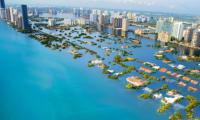Melting planet
Lake Baikal, located in Siberia, Russia, is the world's deepest and oldest freshwater lake. It holds about 20 per cent of the planet’s unfrozen freshwater. Known for its crystal-clear waters, Lake Baikal is home to thousands of plant and animal species, many of which are found nowhere else. However, Lake Baikal is not immune to the impacts of global warming. Rising temperatures have led to significant changes in the lake’s ecosystem. Warmer winters have resulted in thinner ice cover, reducing the time the lake remains frozen. This affects the breeding cycles of species like the Baikal seal and disrupts the natural balance of the lake’s ecosystem.
And this is not the story of Lake Baikal only, but so many other frozen water sources are also facing the same. The Himalayan glaciers are retreating at an alarming rate. These glaciers provide water to billions of people across Asia, and their disappearance could trigger water shortages and destabilize entire ecosystems. Similarly, the Greenland Ice Sheet and Arctic permafrost are melting rapidly, contributing to rising sea levels and releasing trapped methane.
Sajid Awan
Dubai
UAE
-
 AI Rivalry: Anthropic Investors Push To De-escalate Pentagon Clash Over AI Safeguards, Sources Say
AI Rivalry: Anthropic Investors Push To De-escalate Pentagon Clash Over AI Safeguards, Sources Say -
 Jamie Lee Curtis Doubles Down On Her Assertion About 'The Bear's Imminent End
Jamie Lee Curtis Doubles Down On Her Assertion About 'The Bear's Imminent End -
 Nicole Kidman Reacts To Daughters' Possible Future In Hollywood
Nicole Kidman Reacts To Daughters' Possible Future In Hollywood -
 Harry Styles Weighs In On The Origins Of His Muse While Talking About 'Carla’s Song' From Upcoming Album
Harry Styles Weighs In On The Origins Of His Muse While Talking About 'Carla’s Song' From Upcoming Album -
 Alarming: New Research Suggests Global Sea Levels Have Been Underestimated Due To Flawed Modelling
Alarming: New Research Suggests Global Sea Levels Have Been Underestimated Due To Flawed Modelling -
 Meghan Markle Elated As ‘As Ever’ Proves To Be ‘double Edged Sword’
Meghan Markle Elated As ‘As Ever’ Proves To Be ‘double Edged Sword’ -
 Gulf Shipping Crisis Deepens Amid Geopolitical Tensions: Can Global Powers Manage Oil Supply Shortfall?
Gulf Shipping Crisis Deepens Amid Geopolitical Tensions: Can Global Powers Manage Oil Supply Shortfall? -
 Nicole Kidman Suffers From An Alarming Condition As She Experiences Emotional Fallout Amid Keith Urban Split
Nicole Kidman Suffers From An Alarming Condition As She Experiences Emotional Fallout Amid Keith Urban Split -
 Tom Brady's Friends Warn Him About Alix Earle's Real Intentions Following Romance Rumors
Tom Brady's Friends Warn Him About Alix Earle's Real Intentions Following Romance Rumors -
 Khloe Kardashian Shares Update On ‘Daddy’ Back Tattoo Removal
Khloe Kardashian Shares Update On ‘Daddy’ Back Tattoo Removal -
 Fortnite Returns To Google Play Worldwide After Google, Epic Games Settle Dispute
Fortnite Returns To Google Play Worldwide After Google, Epic Games Settle Dispute -
 Demi Lovato Reflects On Being Compared To Miley Cyrus, Selena Gomez During Disney Days
Demi Lovato Reflects On Being Compared To Miley Cyrus, Selena Gomez During Disney Days -
 Prince William Envision More ‘accountability’ When He Makes King
Prince William Envision More ‘accountability’ When He Makes King -
 Brad Pitt Eager To Win Fight Over Daughter Shiloh As His War Against Angelina Jolie's Influence On Kids Continues
Brad Pitt Eager To Win Fight Over Daughter Shiloh As His War Against Angelina Jolie's Influence On Kids Continues -
 Teddi Mellencamp Shares Worrisome Update Amid Stage 4 Cancer Battle: 'I Thought I Had Flu'
Teddi Mellencamp Shares Worrisome Update Amid Stage 4 Cancer Battle: 'I Thought I Had Flu' -
 US, UK Split On Crypto Collaboration: Can Bitcoin Help Secure A New Deal?
US, UK Split On Crypto Collaboration: Can Bitcoin Help Secure A New Deal?




